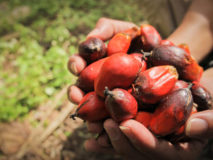
Bron
IUCN Nederland
Yesterday Robeco published its policy on sustainable palm oil, with tangible criteria for exclusion of non-compliant companies and criteria to be eligible for sustainability investing. Furthermore, they launched a collective statement on Sustainable Palm Oil together with Actiam and NN Investment Partners. IUCN NL is happy to see that the rather “invisible” investors speak out, that they go for sustainable palm oil, take their engagement with palm oil producers seriously and take implementation of RSPO as their guidance in doing so. Now, further requirements for investees are an important next step.
Robeco’s sustainable palm oil policy
With the policy regarding sustainable palm oil that was published today, as of January 2019 Robeco sets requirements for palm oil companies in their funds: RSPO membership is required and palm oil companies must ensure at least 20% of their plantations is certified. As of 1st March 2019, the first companies have been excluded from the portfolio. This includes IJM Plantations, that also has operations in Northern Kalimantan, which have been flagged by IUCN NL partner organizations in Indonesia. Companies with 20-80 % RSPO coverage of their plantations are subject to enhanced engagement and need to attain at least 50% RSPO certified plantations by December 2021, otherwise they will be excluded. Between 80-100% RSPO certification coverage companies are eligible to be included in the sustainability investing funds of Robeco and RobecoSAM. Additional due diligence will be done.
Real requirements, along the supply chain
IUCN NL supports Robeco’s move to set clear requirements for all palm oil companies they invest in, with consequences in case of non-compliance. We suggest they and other asset managers turn their engagement with all companies involved in the palm oil supply chain into real requirements in the near future. Real requirements should apply to both sustainable and mainstream funds, and funds managed for others. Also, apart from palm oil companies, sustainability requirements should apply to commodity traders and consumer companies, or companies that have a subsidiary engaged in palm oil in addition to many other activities.
Implementation of Roundtable on Sustainable Palm Oil
Robeco is the first asset manager that has become member of Roundtable on Sustainable Palm Oil (RSPO) in January 2019. Now they can more actively engage with other financial institutions, in the Financial Institutions Taskforce of RSPO and beyond, to set requirements, also to Southeast Asian banks that are so important in palm oil finance. Financial institutions can support the capacity for stronger RSPO implementation in the field. This includes the hard-to-trace (sometimes illegal) parts of the chain, to attain scale and effect of sustainability norms at landscape levels.
The issue of scale
The investors’ statement refers to the 2018 IUCN report on palm oil and biodiversity, which aims to provide a constructive path to improving sustainability in the palm oil industry, in stating that “palm oil has a future as an effective oil crop with the highest yield per hectare compared to other edible oils, provided it is produced sustainably in terms of production practices, location and scale, and its area does not expand at the expense of high conservation value forests, peatlands and other natural habitats.”
The element of scale is important to highlight. Palm oil is the most productive, multiple use oil, but still we can’t put too much pressure on resources for its production, for example in Indonesia but also in new frontier areas such as West Africa. IUCN NL has been arguing against the use of palm oil (or other vegetable oils) for European biofuels and argues for scaling down of other –luxury- products containing palm oil. However, in most cases, replacement of palm oil by other oils such as soy oil, sunflower oil, coconut oil, is not a good idea: if done at a large scale this may require much more land, also in areas with valuable biodiversity and with comparable governance challenges.






